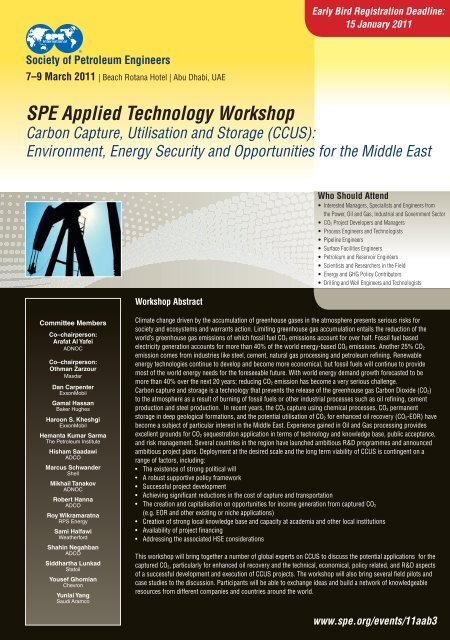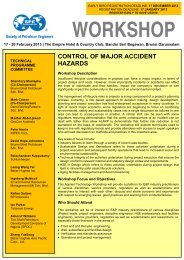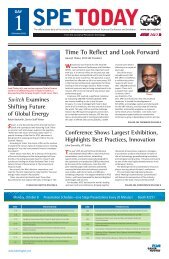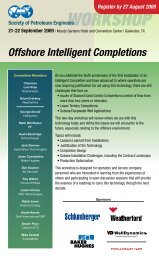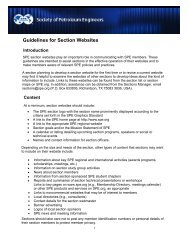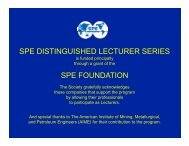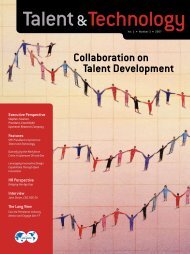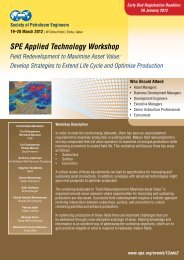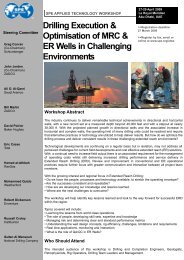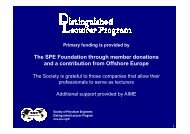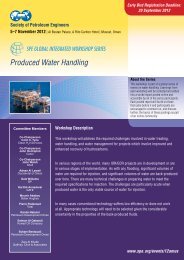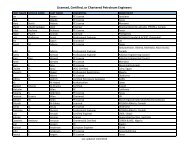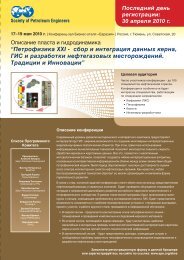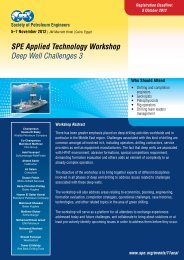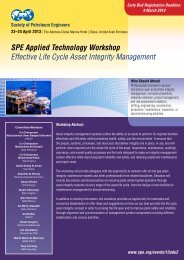SPE Applied Technology Workshop - Society of Petroleum Engineers
SPE Applied Technology Workshop - Society of Petroleum Engineers
SPE Applied Technology Workshop - Society of Petroleum Engineers
Create successful ePaper yourself
Turn your PDF publications into a flip-book with our unique Google optimized e-Paper software.
Early Bird Registration Deadline:<br />
15 January 2011<br />
<strong>Society</strong> <strong>of</strong> <strong>Petroleum</strong> <strong>Engineers</strong><br />
7–9 March 2011 | Beach Rotana Hotel | Abu Dhabi, UAE<br />
<strong>SPE</strong> <strong>Applied</strong> <strong>Technology</strong> <strong>Workshop</strong><br />
Carbon Capture, Utilisation and Storage (CCUS):<br />
Environment, Energy Security and Opportunities for the Middle East<br />
<strong>Workshop</strong> Abstract<br />
Who Should Attend<br />
• Interested Managers, Specialists and <strong>Engineers</strong> from<br />
the Power, Oil and Gas, Industrial and Government Sector<br />
• CO 2 Project Developers and Managers<br />
• Process <strong>Engineers</strong> and Technologists<br />
• Pipeline <strong>Engineers</strong><br />
• Surface Facilities <strong>Engineers</strong><br />
• <strong>Petroleum</strong> and Reservoir <strong>Engineers</strong><br />
• Scientists and Researchers in the Field<br />
• Energy and GHG Policy Contributors<br />
• Drilling and Well <strong>Engineers</strong> and Technologists<br />
Committee Members<br />
Co–chairperson:<br />
Arafat Al Yafei<br />
ADNOC<br />
Co–chairperson:<br />
Othman Zarzour<br />
Masdar<br />
Dan Carpenter<br />
ExxonMobil<br />
Gamal Hassan<br />
Baker Hughes<br />
Haroon S. Kheshgi<br />
ExxonMobil<br />
Hemanta Kumar Sarma<br />
The <strong>Petroleum</strong> Institute<br />
Hisham Saadawi<br />
ADCO<br />
Marcus Schwander<br />
Shell<br />
Mikhail Tanakov<br />
ADNOC<br />
Robert Hanna<br />
ADCO<br />
Roy Wikramaratna<br />
RPS Energy<br />
Sami Halfawi<br />
Weatherford<br />
Shahin Negahban<br />
ADCO<br />
Siddhartha Lunkad<br />
Statoil<br />
Yousef Ghomian<br />
Chevron<br />
Yunlai Yang<br />
Saudi Aramco<br />
Climate change driven by the accumulation <strong>of</strong> greenhouse gases in the atmosphere presents serious risks for<br />
society and ecosystems and warrants action. Limiting greenhouse gas accumulation entails the reduction <strong>of</strong> the<br />
world’s greenhouse gas emissions <strong>of</strong> which fossil fuel CO 2 emissions account for over half. Fossil fuel based<br />
electricity generation accounts for more than 40% <strong>of</strong> the world energy-based CO 2 emissions. Another 25% CO 2<br />
emission comes from industries like steel, cement, natural gas processing and petroleum refining. Renewable<br />
energy technologies continue to develop and become more economical, but fossil fuels will continue to provide<br />
most <strong>of</strong> the world energy needs for the foreseeable future. With world energy demand growth forecasted to be<br />
more than 40% over the next 20 years; reducing CO 2 emission has become a very serious challenge.<br />
Carbon capture and storage is a technology that prevents the release <strong>of</strong> the greenhouse gas Carbon Dioxide (CO 2)<br />
to the atmosphere as a result <strong>of</strong> burning <strong>of</strong> fossil fuels or other industrial processes such as oil refining, cement<br />
production and steel production. In recent years, the CO 2 capture using chemical processes, CO 2 permanent<br />
storage in deep geological formations, and the potential utilisation <strong>of</strong> CO 2 for enhanced oil recovery (CO 2-EOR) have<br />
become a subject <strong>of</strong> particular interest in the Middle East. Experience gained in Oil and Gas processing provides<br />
excellent grounds for CO 2 sequestration application in terms <strong>of</strong> technology and knowledge base, public acceptance,<br />
and risk management. Several countries in the region have launched ambitious R&D programmes and announced<br />
ambitious project plans. Deployment at the desired scale and the long term viability <strong>of</strong> CCUS is contingent on a<br />
range <strong>of</strong> factors, including:<br />
• The existence <strong>of</strong> strong political will<br />
• A robust supportive policy framework<br />
• Successful project development<br />
• Achieving significant reductions in the cost <strong>of</strong> capture and transportation<br />
• The creation and capitalisation on opportunities for income generation from captured CO 2<br />
(e.g. EOR and other existing or niche applications)<br />
• Creation <strong>of</strong> strong local knowledge base and capacity at academia and other local institutions<br />
• Availability <strong>of</strong> project financing<br />
• Addressing the associated HSE considerations<br />
This workshop will bring together a number <strong>of</strong> global experts on CCUS to discuss the potential applications for the<br />
captured CO 2, particularly for enhanced oil recovery and the technical, economical, policy related, and R&D aspects<br />
<strong>of</strong> a successful development and execution <strong>of</strong> CCUS projects. The workshop will also bring several field pilots and<br />
case studies to the discussion. Participants will be able to exchange ideas and build a network <strong>of</strong> knowledgeable<br />
resources from different companies and countries around the world.<br />
www.spe.org/events/11aab3
WORKSHOP<br />
Carbon Capture, Utilisation and Storage (CCUS):<br />
Environment, Energy Security and Opportunities for the Middle East<br />
Sponsorship Support<br />
Sponsorship support helps <strong>of</strong>fset the<br />
cost <strong>of</strong> producing workshops and<br />
allows <strong>SPE</strong> to keep the attendance<br />
price within reach <strong>of</strong> operations-level<br />
individuals, those who benefit most<br />
from these technical workshops.<br />
Sponsors benefit both directly and<br />
indirectly by having their names<br />
associated with a specific workshop.<br />
While <strong>SPE</strong> prohibits any type <strong>of</strong><br />
commercialism within the conference<br />
hall itself, the society recognises that<br />
sponsoring companies <strong>of</strong>fer valuable<br />
information to attendees outside the<br />
technical sessions.<br />
Sponsorship Categories<br />
Sponsorships are <strong>of</strong>fered on a first<br />
come basis. Please contact <strong>SPE</strong> to<br />
verify the availability <strong>of</strong> a particular<br />
sponsorship. Existing sponsors<br />
have the opportunity to renew the<br />
same level <strong>of</strong> sponsorship for annual<br />
workshops. Sponsorship packages<br />
remaining are as follows:<br />
• Silver Sponsorship<br />
• Bronze Sponsorship<br />
• Luncheons-Per Day<br />
• C<strong>of</strong>fee Breaks-Per Day<br />
• Audio-Visual Equipment and<br />
Stationery<br />
• Welcome Reception and Dinner<br />
Sponsorship Benefits<br />
In addition to on-site recognition; <strong>SPE</strong><br />
will recognise sponsors on the <strong>SPE</strong><br />
website and in all printed material<br />
for the workshop. Based on the<br />
sponsorship selected, sponsoring<br />
companies can also receive a<br />
selected number complimentary local<br />
registrations.<br />
For More Information<br />
For a detailed list <strong>of</strong> available<br />
sponsorships, including benefits<br />
and pricing, contact Norvie Tungcul, at<br />
ntungcul@spe.org<br />
SAVE USD 400<br />
BY REGISTERING<br />
BEFORE<br />
15 JANUARY 2011<br />
<strong>Workshop</strong> Sponsor<br />
Schedule<br />
Monday, 7 March 2011<br />
0800–0830 hours Welcome Refreshments, Registration and Badge Collection<br />
0830–0845 hours Seating and Safety Briefing by the Hotel<br />
Co-Chairpersons Welcome Remarks<br />
0845–0900 hours Opening Keynote Address<br />
0900–1040 hours Panel Session 1: CCUS: The Big Picture<br />
Session Chairmen: Arafat Al Yafei, ADNOC; Othman Zarzour, Masdar<br />
Global climate change and global warming as worldwide phenomena are being recently witnessed by billions <strong>of</strong> people.<br />
Every year, less scepticism remains in the scientific and public opinion that the climate change is caused by accumulation<br />
<strong>of</strong> greenhouse gases (especially carbon dioxide) coming primarily from anthropogenic sources. Nations that ratified<br />
the Kyoto protocol 2005 realise the need for global warming mitigation strategy. The proposed practical solution to the<br />
problem is through the coordinated efforts in developing Low-Carbon Economies (LCE) and Low-Fossil-Fuel Economies<br />
(LFFE). With its vast hydrocarbon resources and fast growing economies Middle East region plays an important role<br />
in overall energy and emissions balance. In addition, the local governments make valuable contributions and serious<br />
commitments towards transforming their economies. For example, UAE is considering nuclear and solar power along<br />
with carbon capture, utilisation and storage (CCUS) technologies as the most promising means <strong>of</strong> achieving LCE. Other<br />
countries in the region make similar efforts. The objective <strong>of</strong> this session is to facilitate the exchange <strong>of</strong> ideas and practical<br />
knowledge between participants from different countries on possible ways towards building LCE in the region.<br />
1040–1110 hours C<strong>of</strong>fee Break<br />
1110–1230 hours Session 2: The Oil and Gas Industry and GHG<br />
Session Chairman: Rabiah Ferrouki, Masdar<br />
The oil and gas Industry (O&GI) needs to address the challenge <strong>of</strong> meeting the world’s growing energy demand in a<br />
responsible manner, including issues related to climate change. Historically, O&GI have taken actions to reduce GHG<br />
emissions for a variety <strong>of</strong> reasons both voluntary and compliance-driven. The purpose <strong>of</strong> this session is: i) to show the<br />
efforts exerted by O&GI and its achievements in reducing Green House Gas (GHG) emissions through actions such as<br />
gas flaring reduction and energy efficiency; ii) to present the potential for CCUS in reducing CO 2 emissions, specifically in<br />
relation to other technologies and new applications; and iii) to assess the potential for CCUS regionally, particularly in light<br />
<strong>of</strong> the climate change challenge the world is facing.<br />
1230–1330 hours Luncheon<br />
1330–1510 hours Session 3: Global Initiatives for CCUS: Legal, Regulatory and Deployment Perspectives<br />
Session Chairman: Tim Bertels, Shell<br />
While both the subsurface and surface industries are continuously working on technical solutions to address the<br />
challenges with CO 2 Enhanced Oil Recovery (EOR) Storage, CCS projects, the real solutions will only come from the<br />
representatives <strong>of</strong> the main stakeholders through the efforts <strong>of</strong> governments and international bodies. Government<br />
imposed penalties and/or incentives could provide additional costs and/or income to the project, but these are not the<br />
only means for government to influence behaviour. Stiff liabilities for environmental, safety or health hazards associated<br />
with CO 2 leakage could, for example, be a deterrent to many projects. On the other hand additional incentives to deploy<br />
the CO 2-EOR technology to reduce carbon emissions could come in the form <strong>of</strong> tax deductions, subsidies and/or financial<br />
support. In the final analysis, all these additional investments will require significant commitments both in terms <strong>of</strong><br />
infrastructure as well as CO 2 emission regulations. In this session, we will first review the ongoing initiatives that are<br />
taking place in different parts <strong>of</strong> the world; from regional partnerships to country frameworks as well as discuss the<br />
current challenges and potential steps to go beyond. Other potential topics are:<br />
• Global Overview <strong>of</strong> Legal and Regulatory Frameworks for CCS<br />
• The European <strong>Technology</strong> Platform<br />
• The US Regional CCS Partnerships<br />
• The Australian Framework/Gorgon<br />
• The Scandinavian Frameworks<br />
• The Next Steps to Go Beyond<br />
1510–1540 hours C<strong>of</strong>fee Break<br />
1540–1700 hours Session 4: Challenges and Opportunities – Capturing <strong>Technology</strong><br />
Session Chairmen: Sami Halfawi, Weatherford; Haroon Kheshgi, ExxonMobil<br />
A variety <strong>of</strong> technologies exist to capture CO 2 – forming a CO 2 stream by generating it directly or separating it from<br />
more dilute gas steams - so that a captured CO 2 stream can be effectively transported, utilised and sequestered away<br />
from the atmosphere. The cost <strong>of</strong> CO 2 capture, which can dominate the overall cost <strong>of</strong> CCUS, presents a significant<br />
economic barrier to CCUS and leads to a focus on gas streams where composition, scale and co-benefits leads to lower<br />
capture costs. This session addresses development, demonstration and assessment <strong>of</strong> promising capture technologies<br />
appropriate for CCUS opportunities in the Middle East.<br />
Tuesday, 8 March 2011<br />
Gold Sponsor<br />
0830–0900 hours Welcome Refreshments, Registration and Badge Collection<br />
0900–1040 hours Session 5: Challenges and Opportunities – CCS/EOR<br />
Session Chairmen: Shahin Neghaban, ADCO; Roy Wikramaratna, RPS Energy<br />
The rapid growth <strong>of</strong> industrial and urban development in the GCC countries has generated unprecedented power demand<br />
particularly during summer months. At the same time, the GCC countries have one <strong>of</strong> the highest carbon footprints per<br />
capita in the world. With the current international agenda for developed countries to reduce carbon emissions, there are<br />
two highly visible and potentially valuable techniques that might be adopted (a) permanent disposal <strong>of</strong> emitted CO 2 in<br />
deep saline aquifers and (b) utilisation <strong>of</strong> CO 2 injection as an EOR process in oilfields to maximise ultimate recovery and<br />
simultaneously dispose <strong>of</strong> CO 2. This session will discuss opportunities and challenges associated with CO 2 utilisation and<br />
storage, including:
Registration Deadline: 20 February 2011<br />
www.spe.org/events/11aab3<br />
• Large Scale Modelling <strong>of</strong> the Physical Processes Associated with Subsurface CO 2 Sequestration<br />
Storage Mechanisms<br />
Storage Volume Estimation<br />
Practical Criteria for Effective Storage<br />
• Simulation Challenges for CO 2 EOR Processes<br />
1040–1110 hours C<strong>of</strong>fee Break<br />
1110–1230 hours Session 6: Challenges and Opportunities – Transportation and Facilities Integrity<br />
Session Chairmen: Dan Carpenter, ExxonMobil; Hisham Saadawi, ADCO<br />
The infrastructure needed to transport liquid CO 2 from capture projects such as power plants, heavy industry,<br />
and/or natural sources must be constructed to bring CO 2 to areas <strong>of</strong> sequestration, disposal, EOR, or other safe storage<br />
projects. Increasingly ambitious CCS utilisation will necessitate a large CO 2 pipeline network. In the United States CO 2 is<br />
transported via a 1,500 mile network. CO 2 must be pressurised to reach a high density liquid like state. Generally short<br />
transport distances are by pipeline, and longer distance by rail or ship also in liquid state. In addition to the physical<br />
aspects <strong>of</strong> CO 2 transportation issues <strong>of</strong> corrosion maintenance and reduction <strong>of</strong> impurities (such as H 2S) must be<br />
factored in for selection <strong>of</strong> proper pipeline or other transportation facility options. Dehydration <strong>of</strong> CO 2 is necessary if<br />
carbon-manganese steels are used for pipeline construction, but if moisture-laden CO 2 is to be transported, pipeline must<br />
be constructed from corrosion-resistant alloy, or be clad with an alloy or continuous polymer coating. This session will<br />
discuss potential challenges associated with CO 2 transportation and facilities integrity issues associated with pipeline<br />
steel selection ensuring the safe, reliable transportation <strong>of</strong> CO 2 between capture and injection projects currently being<br />
envisaged for UAE.<br />
1230–1330 hours Luncheon<br />
1330–1510 hours Session 7: Emerging Technologies (this session is tentative)<br />
Session Chairmen: Yunlai Yang, Saudi Aramco; Marcus Schwander, Shell<br />
CO 2 sequestration, is one method <strong>of</strong> disposing <strong>of</strong> CO 2. However there are alternative methods that recycle rather than<br />
bury CO 2. Technologies include Bio-CCS Algal synthesis, carbon dioxide scrubbing, single step methanol production and<br />
the two-step Fischer-Tropsch process. The two step process utilises solar energy to produce hydrocarbons from CO 2.<br />
Other technologies exist that can convert carbon dioxide into plastics and cyclic carbonates (widely used raw material<br />
in chemical industry). These recycling technologies could be economically attractive as they may <strong>of</strong>fer a return on<br />
investment due to the production <strong>of</strong> high value commodities such as oil and plastics. Therefore, recycling may be more<br />
attractive than sequestration since sequestration <strong>of</strong>fers no intrinsic value in terms <strong>of</strong> saleable commodities and relies<br />
mainly on carbon trading and/or punitive legislation restricting CO 2 output into the atmosphere.<br />
This session is designed to cover any technology that <strong>of</strong>fers alternatives to CO 2 sequestration. An opportunity will be<br />
given to explore new or emerging technologies that are still in the early phase.<br />
1510–1540 hours C<strong>of</strong>fee Break<br />
1540–1700 hours Session 8: Breakout Session<br />
Wednesday, 9 March 2011<br />
0800–0900 hours Welcome Refreshments, Registration and Badge Collection<br />
0900–1040 hours Session 9: CCUS Policy<br />
Session Chairmen: Othman Zarzour, Masdar; Arafat Al Yafei, ADNOC<br />
Some governments are making significant investments in CCS research and development to address the risks, real and<br />
perceived, associated with this emergent industry and to advance the competitiveness <strong>of</strong> CCS as a commercially-viable,<br />
technologically-mature method for limiting GHG emissions and mitigating climate change. This session will show how<br />
national governments’ policies will play a vital role in ensuring that deployment is safe and effective in any future CCS<br />
industry. Policy issues around environmental impacts, liability, safety, legal and regulatory will be deliberated.<br />
1000–1100 hours Session 10: Economical Aspects and Financial Incentives<br />
Session Chairmen: Robert Hanna, ADCO; Kerist<strong>of</strong>er Seryani, Masdar<br />
The challenge for economic use <strong>of</strong> CO 2 for EOR in the Middle East is timing. Initial studies and pilot projects will serve<br />
not only to inform the technical aspects <strong>of</strong> CO 2 EOR and potential for storage, they will also inform the economic<br />
underpinnings <strong>of</strong> an EOR industry. The current challenges for a pr<strong>of</strong>itable, sustainable business include:<br />
• Field Maturity<br />
• High Supply and Use Cost<br />
• Lack <strong>of</strong> Mechanisms to Bridge the Economic Gap.<br />
In the long run, the value <strong>of</strong> additional oil recovery will increase and the cost <strong>of</strong> using CO 2 for EOR will decrease,<br />
especially when the penalties for CO 2 emissions or premium for sequestration become reality. The economic cross-over<br />
point is out in the future and will be different in every country, field and reservoir. Our challenge is to bring that point<br />
forward so that we can economically sequester CO 2 which otherwise would be vented to the atmosphere.<br />
1100–1130 hours C<strong>of</strong>fee Break<br />
1130–1230 hours Session 11: Regional Integrated Efforts<br />
Session Chairman: Shahin Neghaban, ADCO; Arafat Al Yafei, ADNOC<br />
Energy security, high power demand and clean environment are regional common concerns in the Middle-East; therefore<br />
it is imperative to create regional integration efforts to face opportunities and challenges associated with CCUS.<br />
Implementation <strong>of</strong> large scale CCUS projects requires a significant undertaking in CCUS R&D, steady source and supply<br />
<strong>of</strong> CO 2 with adequate facilities to handle separation, compression and transportation <strong>of</strong> large volumes <strong>of</strong> CO 2, and finally<br />
a detailed energy policy. These challenges are resource and cost intensive and a viable approach for cost and resource<br />
control and optimisation can be achieved through regional integration collaboration between GCC countries. This session<br />
will discuss ways and means by which these regional integration efforts can be realised.<br />
1230–1245 hours <strong>Workshop</strong> Summary and Closing<br />
1245–1330 hours Luncheon<br />
1330–1600 hours Trip to Masdar Institute<br />
<strong>Workshop</strong> Venue<br />
Beach Rotana Hotel<br />
P.O. Box 45200<br />
Abu Dhabi, UAE<br />
Tel: +971.2.697.9071<br />
Fax: +971.2.697.9894<br />
Website: www.rotana.com<br />
<strong>Workshop</strong> Guidelines<br />
Format<br />
Three (3) days <strong>of</strong> informal discussions<br />
prompted by selected keynote presentations<br />
and discussions. <strong>Workshop</strong>s maximise<br />
the exchange <strong>of</strong> ideas among attendees<br />
and presenters through brief technical<br />
presentations followed by extended Q&A<br />
periods. Focused topics attract an informed<br />
audience eager to discuss issues critical<br />
to advancing both technology and best<br />
practices. The majority <strong>of</strong> the presentations<br />
are in the form <strong>of</strong> case studies, highlighting<br />
engineering achievements and lessons learnt.<br />
In order to stimulate frank discussion, no<br />
proceedings are published and the press is<br />
not invited to attend.<br />
Documentation<br />
• Proceedings will not be published;<br />
therefore, formal papers and handouts are<br />
not expected from speakers.<br />
• Work in progress, new ideas, and<br />
interesting projects are sought.<br />
• Pr<strong>of</strong>essionally-prepared visual aids are not<br />
required; handwritten view graphs are<br />
entirely acceptable.<br />
• Note-taking by participants is encouraged.<br />
Poster Session<br />
The Steering Committee encourages<br />
registrations from pr<strong>of</strong>essionals who are able<br />
to prepare and present a poster on a relevant<br />
project. For further details kindly contact<br />
Norvie Tungcul, event manager at<br />
ntungcul@spe.org.<br />
Attendance<br />
Registrations will be accepted on a first-come,<br />
first-serve basis. The Steering Committee<br />
encourages attendance from those who can<br />
contribute to the workshop most effectively<br />
either in discussions or with posters. A<br />
mix <strong>of</strong> attendees in terms <strong>of</strong> geographic<br />
origin, companies and disciplines will be<br />
encouraged.<br />
<strong>Workshop</strong> Deliverables<br />
• The Steering Committee will appoint a<br />
“scribe” to record the discussions and to<br />
produce the full workshop report for <strong>SPE</strong>.<br />
• This report will be circulated to all<br />
attendees as the workshop deliverable<br />
within 4–6 weeks following the workshop.<br />
The copyright <strong>of</strong> the report is with <strong>SPE</strong>.<br />
• PowerPoint presentation materials will be<br />
posted on a specific <strong>SPE</strong> URL address<br />
after the workshop. Provision <strong>of</strong> the<br />
materials by the speakers will signify their<br />
permission for <strong>SPE</strong> to do so.<br />
Commercialism<br />
In keeping with ATW objectives and the<br />
<strong>SPE</strong> mission, commercialism in posters or<br />
presentations will not be permitted. Company<br />
logos must be limited to the title slide and<br />
used only to indicate the affiliation <strong>of</strong> the<br />
presenter and others involved in the work.<br />
Attendance Certificate<br />
All attendees will receive an attendance<br />
certificate attesting to their participation in<br />
the workshop. This certificate will be provided<br />
in exchange for a completed workshop<br />
Questionnaire.<br />
Continuing Education Units<br />
Attendees at this workshop qualify for <strong>SPE</strong><br />
Continuing Education Units (CEU) at the rate<br />
<strong>of</strong> 0.1 CEU per hour <strong>of</strong> the workshop.<br />
PLEASE USE INSIDE FORM FOR<br />
REGISTRATION
REGISTRATION FORM<br />
Carbon Capture, Utilisation and Storage (CCUS): Environment, Energy Security and Opportunities for the Middle East<br />
7–9 March 2011, Beach Rotana Hotel, Abu Dhabi, UAE<br />
Important: Attendance is limited and is not guaranteed. Early registration is recommended. Please print or type in black ink.<br />
Registration Fee MUST be paid in advance for attending the <strong>Applied</strong> <strong>Technology</strong> <strong>Workshop</strong>.<br />
First Name/Forename _________________________________________________ Middle Name __________________________________________________<br />
Last/Family Name _______________________________________________________________________________________ <strong>SPE</strong> Member? ❒ Yes ❒ No<br />
Member No. _________________________________________ Job Title ____________________________________________________________________<br />
Company/Organisation ______________________________________________________________________________________________________________<br />
Street or P.O. Box Number ____________________________________________________________________ City __________________________________<br />
State/Province __________________________________ Zip/Postal Code __________________________ Country __________________________________<br />
Telephone ___________________________________________ Facsimile<br />
Email (required) ___________________________________________________________________________________________________________________<br />
WORKSHOP<br />
<strong>Applied</strong> <strong>Technology</strong> <strong>Workshop</strong> Fee: Before 15 January 2010 ❒ USD 1,450 for <strong>SPE</strong> Members ❒ USD 1,650 for Nonmembers<br />
After 15 January 2010 ❒ USD 1,850 for <strong>SPE</strong> Members ❒ USD 2,050 for Nonmembers<br />
<strong>Applied</strong> <strong>Technology</strong> <strong>Workshop</strong> Fee includes: Technical sessions, materials, daily c<strong>of</strong>fee breaks and luncheons and welcome reception (if applicable).<br />
Accommodation is NOT included in the workshop registration fee.<br />
Do you wish to present a poster? (subject to selection) ❒ Yes ❒ No<br />
Do you wish to be considered a Discussion Leader? (subject to selection) ❒ Yes ❒ No<br />
If yes, please indicate which subject you would like to present on:<br />
Credit Card (Check One): ❒ American Express ❒ MasterCard ❒ Visa<br />
NO REFUNDS will be granted on cancellations on or after 1 March 2011.<br />
Save on future events….<br />
Join <strong>SPE</strong> today for TWO years<br />
and Pay USD 100 Only!<br />
❒ Yes ❒ No<br />
Card Number (will be billed through <strong>Society</strong> <strong>of</strong> <strong>Petroleum</strong> <strong>Engineers</strong>)<br />
Expiration Date (mm/yy)<br />
Name <strong>of</strong> Credit Card Holder (printed) ________________________________________________________________________________________________<br />
Signature: (required) _________________________________________________________________________ Date ______________________________<br />
Please inform us <strong>of</strong> mobility or special dietary needs ____________________________________________________________________________________<br />
Payment by Bank Transfer: IMPORTANT - For reference: Please quote “11AAB3 ” and name <strong>of</strong> delegate<br />
Make Payment to: HSBC Bank Middle East, Jebel Ali Branch, P.O. Box 66, Dubai, UAE<br />
Account Name: <strong>SPE</strong> Middle East FZ-LLC Account Number: 035-129709-100 Swift Code: BBMEAEAD<br />
Cancellation and Refund Policy:<br />
• A processing fee <strong>of</strong> USD 100 will be charged for cancellations received before the registration deadline 20 February 2011.<br />
• For cancellations received after the registration deadline, 20 February 2011, 25% refund will be made to the registrant.<br />
• No refund on cancellations received within seven (7) days prior to the training course, i.e. on or after 1 March 2011.<br />
• No refund will be issued if a registrant fails to attend the workshop.<br />
Visa:<br />
<strong>SPE</strong> Middle East, North Africa and India will assist in providing a visa invitation letter, upon request in writing, to confirmed registrants after receiving full payment <strong>of</strong> registration<br />
fees. Visa invitation letters take five days to issue from the date <strong>of</strong> request and it is the course attendee’s responsibility to obtain their own visa. <strong>SPE</strong> cannot issue the visa nor can we<br />
guarantee it will be obtained.<br />
11AAB3<br />
For questions or additional information contact: Norvie Tungcul at ntungcul@spe.org.<br />
To submit your registration online, please visit the event’s website at: www.spe.org/events/11aab3.<br />
Alternatively, you can email this form to: formsdubai@spe.org, or fax it to: +971.4.366.4648.


